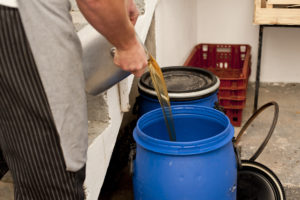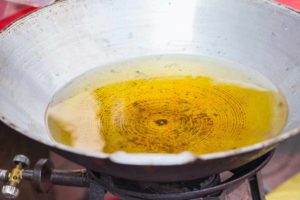As the world continues to grapple with the consequences of climate change, businesses of all sizes are seeking ways to reduce their environmental impact. One often overlooked area is the disposal of used cooking oil, which can have a significant impact on the environment if not handled properly. While most commercial kitchens produce a significant amount of used cooking oil, many businesses are unaware of the potential benefits of recycling it.
In this article, we will explore the benefits of used cooking oil recycling for commercial businesses and how to recycle used cooking oil.
Benefits of Recycling cooking oil
When cooking oil reaches the end of its useful life, it is frequently underused. Cooking oil is frequently discarded after consumption rather than recycled. Restaurants should create efficient oil recycling strategies that are sustainable for several reasons, including:
-
Facilities and Appliances Preservation
Cooking oil and grease disposal errors can cost you money in drain and kitchen appliance repairs. Even while oil may appear to be flowing down the drain as a liquid, it may eventually harden and cause a blockage in your local or personal drainage system. Also, poor handling of oil waste frequently violates regulatory requirements, which could get you or your company into legal trouble.

-
Decreased Health Hazards
Cooking oils can harm your clients or the community’s health if they are disposed of carelessly. It has been demonstrated that the sewage problems brought on by drain-blocking oils convey harmful bacteria and pathogens, and that trapped oil, grease, and fats emit noxious smells.
-
Preservation of local and global environments
When oil and grease are correctly recycled, the risk of these waste materials hurting the environment and natural resources including soil and water systems is decreased. Vegetable and animal fat spills “have the same or similar destructive impacts on the aquatic ecosystem as petroleum oils,” according to the Environmental Protection Agency (EPA).
By choosing to participate in oil waste recycling, you are also demonstrating your commitment to sustainable systems as a whole and to the development of green and renewable fuels.
How to Recycle Cooking Oil at Home
Oil is a necessary component of home cooking and therefore NJ Oil Recyclers’ cooking oil recycling program serves restaurants and other commercial establishments. Vegetables, canola, corn, sesame, and olive oils are examples of typical home oils. Lard, butter, and bacon fat are a few examples of products and fats made from animals.
Any of these oils might cause havoc on your plumbing system if you pour them down the kitchen sink drain. Instead, try these strategies to get rid of cooking oil in your house properly.
1. Reuse
Cooking oil can be used again after the initial usage, a fact that is frequently unknown. For households who frequently use significant amounts of oil, such as when frying food, this is an economical and environmental solution. Nevertheless, it’s vital to remember that with each use, the smoking point of the oil will drop—so only reuse oils with an initially high smoke point, such as canola or avocado oil.
Following use, filter your oil with cheesecloth or another type of filter to get rid of any leftover food. After that, gently pour it into a container that is sealed, and keep it in the refrigerator until needed. Rancid oil can encourage the growth of hazardous microorganisms, thus it must be stored correctly when being reused. Always examine the oil for symptoms of rancidity before using it.

2. Reimagine
As odd as it may sound, leftover cooking oil may be recycled and transformed into soap bars. As fats are frequently the starting point for soap formulations, you can easily make your own unique, sustainable soap bar by utilizing discarded cooking oil.
3. Recycle
Finally, look into regional oil recycling programs. Although residential areas frequently lack oil recycling facilities, more and more cities are providing oil recycling centers or setting drop-off days for households to recycle their oil. UCO is recyclable and can be turned into biodiesel, which can be used to power diesel engines.
It’s crucial to keep in mind not to pour your household cooking oil down the drain if you don’t have any other options for recycling it. If you must discard UCO, place it inside a closed container, such as a spare bottle or can.
Restaurant Cooking Oil Recycling
As grease and oil are byproducts of the food industry, there are stringent rules in place to ensure their correct disposal. As a result, companies need to develop a recycling strategy for their UCO. This frequently entails hiring industrial oil recyclers to collect stored oil, which frequently benefits the restaurant financially.
The term “yellow grease” refers to used cooking oil and other fats that are gathered from commercial or industrial cooking operations. Because UCO can be processed into biodiesel and used as fuel, yellow grease is associated with petroleum oil values. As a result, a lot of eateries that use a lot of oil will work with oil recyclers to give or sell their used cooking oil (UCO) for use in biofuel or other sustainable projects.
Oil may be safely collected from kitchen appliances, such as fryers, and kept in collection containers for later pickup thanks to in-house technology. Smaller eateries may feature grease traps that segregate used oil from any accumulated wastewater (built into the floor or in subterranean tanks outside). As a result, a mixture of fats, oils, and greases known as brown grease is produced. This FOG mixture is collected separately to protect water systems.
How Does Recycling of Used Oil Work?
Yellow grease is collected, brought to oil recycling facilities such as NJ Oil Recyclers, and processed there. To get rid of any remaining food product, the UCO is boiled and filtered in this instance.

After then, the mixture will continue to settle until the three components—grease, water, and fine solids—are naturally separated. From there, the grease product is separated from the other layers and placed into a centrifuge to be spun. UCO becomes a reusable resource as a result of this process.
In contrast, brown grease is transported to a wastewater treatment facility with the goal of eliminating the FOG so it won’t impact water systems. An on-site anaerobic digester at some wastewater treatment facilities extracts natural gas from the FOG.
Options for Recycling Grease and Oil
Remember that spent cooking oil is a highly useful resource whether you’re using it at home or in your place of work.
No matter what kind of oil you handle, everyone is required by law to exercise basic due diligence, and inappropriate handling of old oil can get you in hot water. In order to obtain a state or local permit, waste carriers frequently need to adhere to strict requirements and have a current EPA identification number. When it comes to recycling cooking oil, choosing the correct waste management provider is essential to lowering your risk exposure.
If your company generates a lot of used cooking oil, look online for local programs for recycling grease. Make sure the courses you’re looking at are specialized for industrial used cooking oil or grease trap cleaning services. Rubicon can offer specialized guidance in this area
Contact NJ Oil Recyclers if you have any inquiries regarding recycling used cooking oil.



